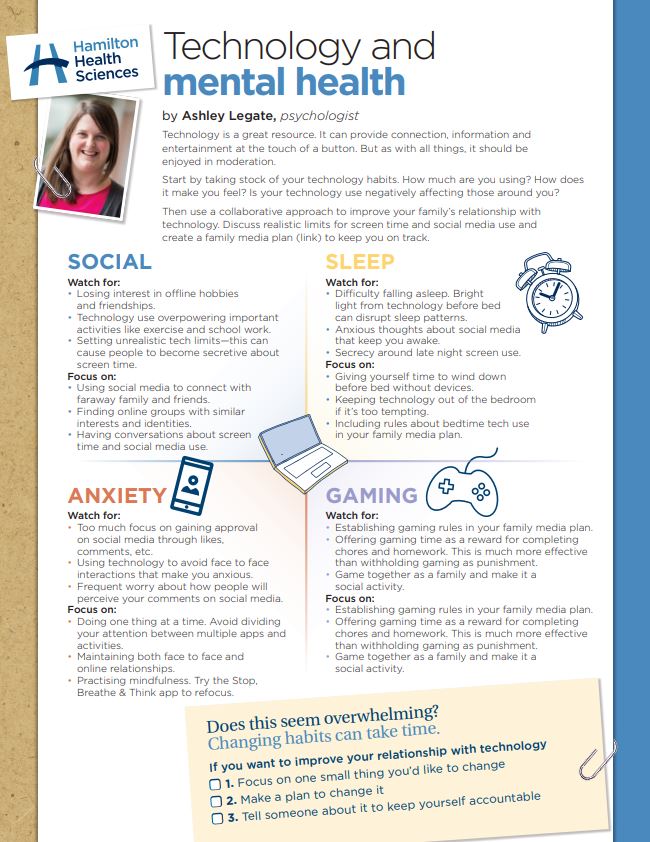
Tips for improving your family’s digital health
by: Dr. Ashley Legate, psychologist
Do you ever think about the relationship between technology and mental health? Technology is a great resource. It can provide connection, information and entertainment at the touch of a button. But as with all things, it should be enjoyed in moderation.
Start by taking stock of your technology habits. How much are you using? How does it make you feel? Is your technology use negatively affecting those around you?
Then use a collaborative approach to improve your family’s relationship with technology. Discuss realistic limits for screen time and social media use and create a family media plan to keep you on track.
How does technology affect our mental health?
Social
Watch for:
• Losing interest in offline hobbies and friendships.
• Technology use overpowering important activities like exercise and school work.
• Setting unrealistic tech limits—this can cause people to become secretive about screen time.
Focus on:
• Using social media to connect with faraway family and friends.
• Finding online groups with similar interests and identities.
• Having conversations about screen time and social media use.
Anxiety
Watch for:
• Too much focus on gaining approval on social media through likes, comments, etc.
• Using technology to avoid face to face interactions that make you anxious.
• Frequent worry about how people will perceive your comments on social media.
Focus on:
• Doing one thing at a time. Avoid dividing your attention between multiple apps and activities.
• Maintaining both face to face and online relationships.
• Practising mindfulness. Try the Stop, Breathe & Think app to refocus.
Sleep
Watch for:
• Difficulty falling asleep. Bright light from technology before bed can disrupt sleep patterns.
• Anxious thoughts about social media that keep you awake.
• Secrecy around late night screen use.
Focus on:
• Giving yourself time to wind down before bed without devices.
• Keeping technology out of the bedroom if it’s too tempting.
• Including rules about bedtime tech use in your family media plan.
Gaming
Watch for:
• Decreased time spent on other, previously enjoyed activities.
• Sudden academic problems.
• Serious difficulty managing emotions after stopping gaming.
Focus on:
• Establishing gaming rules in your family media plan.
• Offering gaming time as a reward for completing chores and homework. This is much more effective than withholding gaming as punishment.
• Game together as a family and make it a social activity.
Technology and mental health: take it day by day
Does this seem overwhelming? Changing habits can take time. If you want to improve your relationship with technology:
- focus on one small thing you’d like to change
- make a plan to change it
- tell someone about it to keep yourself accountable!

Screen Time
The average Canadian child racks up 7.5 hours of screen time every day. While there are benefits to certain types of screen time, it’s important for parents to make informed decisions about how and when their children use screens.
For typically developing children, the Canadian Paediatric Society recommends no screen time under age two and less than one hour per day between ages two and five. Even in school-aged children, screen time should be limited and should focus on activities that support health and learning. Young children who are exposed to too much screen time are at greater risk of:
- Becoming overweight
- Having difficulty sleeping
- Being less prepared for school
- Becoming inattentive, aggressive, and less able to self-soothe
Creating good screen habits early on prepares children to better manage their screen time independently as they get older.
Remember the four M’s
Minimize: Set limits on daily screen time, maintain ‘screen-free’ time for reading and family meals, turn off screens when not in use, and avoid screens for at least one hour before bed.
Mitigate risk: Be aware of the content your child is engaging with and be present and involved during their screen time.
Be Mindful: Take stock of your family’s screen habits and make sure they aren’t interfering with meaningful activities. Teach your children to question advertising messages and think about what they’re watching.
Model good behaviour: Minimize your own screen time when kids are present, especially during meals. Focus on conversation, interactive play and healthy activities.
Trouble managing screen time? Talk to your family doctor or call your local Contact agency. Contact Hamilton: (905) 570-8888.
